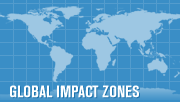Global Warming: Who Loses - and Who Wins?
The Atlantic Monthly, April 2007
In his April article for the Atlantic Monthly, Gregg Easterbrook details who will be disadvantaged by the effects of worldwide global warming - and who will benefit from it. Key points:
- Larger climate shifts have catalyzed the rise and fall of whole societies.
- If the global climate continues changing, many people and nations will find themselves in possession of land and resources of rising value, while others will suffer dire losses—and these winners and losers could start appearing faster than you might imagine.
- Climate change could upset the applecarts of real-estate values all over the world, with low-latitude properties tanking while high latitudes become the Sun Belt of the mid-21st century.
- The equatorial and low-latitude areas of the world presumably will become hotter and less desirable as places of habitation, plus less valuable in economic terms; with a few exceptions, these areas are home to developing nations where living standards are already low.
- ...nearly all the added land-value benefits of a warming world might accrue to Alaska, Canada, Greenland, Russia, and Scandinavia.
The Atlantic Monthly
Global Warming: Who Loses - and Who Wins?
By Gregg Easterbrook
April 2007
Coastal cities inundated, farming regions parched, ocean currents disrupted, tropical diseases spreading, glaciers melting—an artificial greenhouse effect could generate countless tribulations.
If Earth’s climate changes meaningfully—and the National Academy of Sciences, previously skeptical, said in 2005 that signs of climate change have become significant—there could be broad-based disruption of the global economy unparalleled by any event other than World War II.
Economic change means winners as well as losers. Huge sums will be made and lost if the global climate changes. Everyone wonders what warming might do to the environment—but what might it do to the global distribution of money and power?
Whether mainly natural or mainly artificial, climate change could bring different regions of the world tremendous benefits as well as drastic problems. The world had been mostly warming for thousands of years before the industrial era began, and that warming has been indisputably favorable to the spread of civilization. The trouble is that the world’s economic geography is today organized according to a climate that has largely prevailed since the Middle Ages—runaway climate change would force big changes in the physical ordering of society. In the past, small climate changes have had substantial impact on agriculture, trade routes, and the types of products and commodities that sell. Larger climate shifts have catalyzed the rise and fall of whole societies. The Mayan Empire, for instance, did not disappear “mysteriously”; it likely fell into decline owing to decades of drought that ruined its agricultural base and deprived its cities of drinking water. On the other side of the coin, Europe’s Medieval Warm Period, which lasted from around 1000 to 1400, was essential to the rise of Spain, France, and England: Those clement centuries allowed the expansion of farm production, population, cities, and universities, which in turn set the stage for the Industrial Revolution. Unless greenhouse-effect theory is completely wrong—and science increasingly supports the idea that it is right—21st-century climate change means that sweeping social and economic changes are in the works.
To date the greenhouse-effect debate has been largely carried out in abstractions—arguments about the distant past (what do those 100,000-year-old ice cores in Greenland really tell us about ancient temperatures, anyway?) coupled to computer-model conjecture regarding the 22nd century, with the occasional Hollywood disaster movie thrown in. Soon, both abstraction and postapocalyptic fantasy could be pushed aside by the economic and political realities of a warming world. If the global climate continues changing, many people and nations will find themselves in possession of land and resources of rising value, while others will suffer dire losses—and these winners and losers could start appearing faster than you might imagine. Add artificially triggered climate change to the volatility already initiated by globalization, and the next few decades may see previously unthinkable levels of economic upheaval, in which fortunes are won and lost based as much on the physical climate as on the business climate.
To read the rest of the article, please CLICK HERE.



